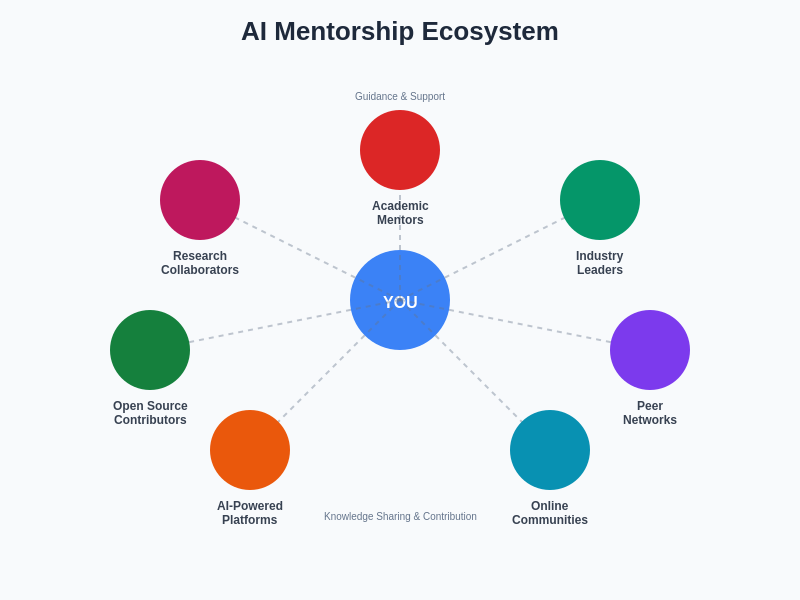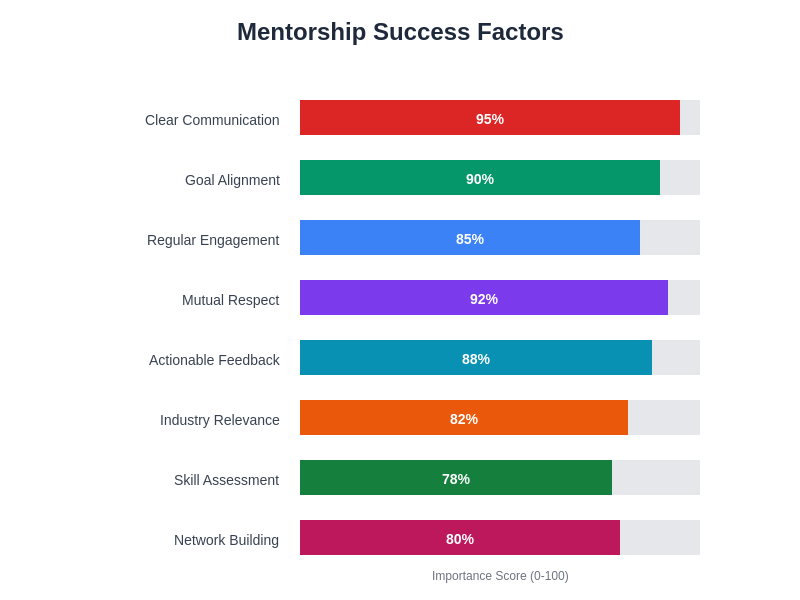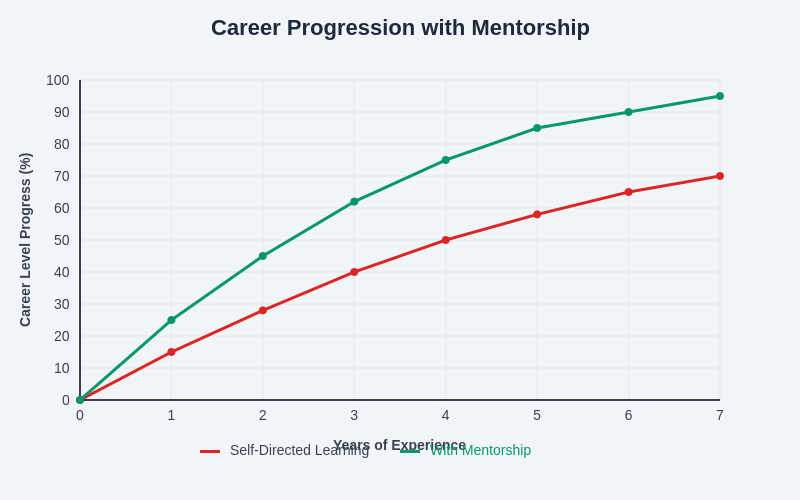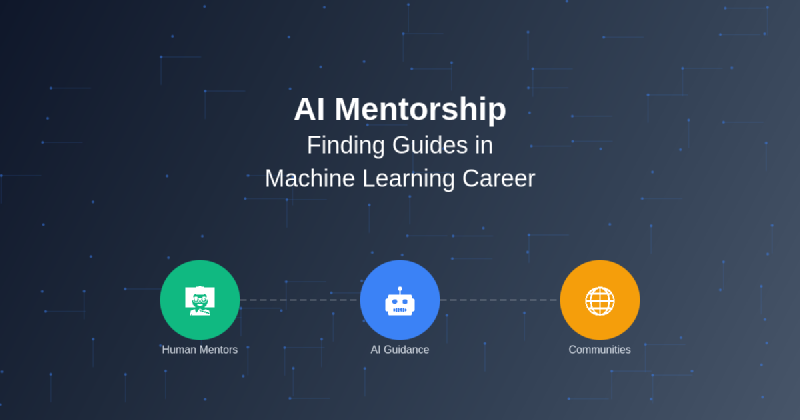The rapidly evolving landscape of artificial intelligence and machine learning presents both unprecedented opportunities and unique challenges for professionals seeking to advance their careers in this dynamic field. As the demand for AI expertise continues to surge across industries, the importance of effective mentorship has become increasingly critical for navigating the complex pathways toward success in machine learning careers. The intersection of traditional human mentorship with emerging AI-powered guidance systems has created a revolutionary approach to professional development that transcends conventional career advancement strategies.
Explore the latest AI career trends and insights to understand how mentorship roles are evolving in response to technological advancement and industry transformation. The modern AI professional must navigate an ecosystem where technical expertise, strategic thinking, and continuous learning converge to create sustainable career trajectories that adapt to the rapid pace of technological innovation.
The Evolution of Mentorship in the AI Era
Traditional mentorship models have undergone significant transformation in response to the unique demands of artificial intelligence careers. The conventional one-to-one mentor-mentee relationship, while still valuable, has expanded to encompass diverse forms of guidance that reflect the interdisciplinary nature of AI work. Modern AI mentorship encompasses technical skill development, research methodology, industry navigation, ethical considerations, and strategic career planning, requiring mentors who possess both deep technical knowledge and broad industry perspective.
The emergence of AI-powered mentorship platforms has revolutionized access to career guidance by providing personalized learning pathways, skill assessments, and career trajectory recommendations based on individual strengths, interests, and market demands. These intelligent systems analyze vast amounts of career data, industry trends, and professional success patterns to offer insights that complement human mentorship with data-driven precision and scalability.
Identifying the Right Mentorship Opportunities
The process of finding effective mentorship in machine learning requires strategic thinking and proactive engagement with multiple sources of guidance. Academic mentorship through research supervisors, industry professionals, and senior practitioners each offer distinct perspectives that contribute to comprehensive career development. Academic mentors provide theoretical foundations, research methodologies, and scientific rigor, while industry mentors offer practical insights into commercial applications, project management, and business strategy.
Professional networks, conference connections, and online communities have become increasingly important sources of mentorship opportunities. Platforms like LinkedIn, GitHub, and specialized AI communities facilitate connections between aspiring professionals and experienced practitioners who can provide guidance on specific career challenges, technical questions, and industry insights. The key to successful mentorship identification lies in recognizing that different mentors serve different purposes throughout various stages of career development.
Enhance your professional development with AI tools like Claude that can provide personalized career guidance, skill development recommendations, and strategic planning support tailored to your specific goals and circumstances. The integration of AI mentorship tools with human guidance creates a comprehensive support system that adapts to individual learning styles and career aspirations.
Traditional Human Mentorship in AI Careers
Human mentorship remains irreplaceable in providing emotional support, nuanced career advice, and industry wisdom that comes from lived experience in the AI field. Experienced AI professionals offer insights into career transitions, technical challenges, research directions, and industry dynamics that cannot be replicated by automated systems. The personal connection and trust that develop through human mentorship relationships provide a foundation for honest feedback, strategic guidance, and professional advocacy that proves invaluable throughout career progression.
Senior AI researchers and industry leaders often serve as mentors by sharing their experiences navigating research challenges, publication processes, grant applications, and career transitions between academia and industry. These mentorship relationships frequently extend beyond technical guidance to encompass professional networking, conference presentations, and collaborative research opportunities that accelerate career advancement and industry recognition.
AI-Powered Mentorship and Guidance Systems
The integration of artificial intelligence into mentorship has created sophisticated guidance systems that provide personalized career development support at scale. AI mentorship platforms analyze individual skill profiles, learning preferences, career goals, and market trends to deliver customized recommendations for skill development, project selection, and career progression. These systems continuously adapt their guidance based on user progress, industry changes, and emerging technology trends.
Machine learning algorithms power career recommendation engines that suggest optimal learning paths, identify skill gaps, and predict career trajectory outcomes based on various decision scenarios. These AI mentorship tools excel at processing vast amounts of career data, identifying patterns in successful career progressions, and providing objective analysis of market opportunities and skill demand trends that inform strategic career decisions.
Building Effective Mentor-Mentee Relationships
Successful mentorship relationships in AI careers require clear communication, mutual respect, and aligned expectations between mentors and mentees. Effective mentees actively engage with their mentors by preparing thoughtful questions, implementing advice, and providing regular updates on progress and challenges. The reciprocal nature of modern mentorship means that mentees also contribute value by sharing fresh perspectives, current academic knowledge, and emerging technology insights that benefit experienced mentors.
The establishment of structured mentorship frameworks, including regular meeting schedules, goal-setting processes, and progress evaluation mechanisms, enhances the effectiveness of mentorship relationships. Successful AI mentorship often involves project-based collaboration, where mentees work alongside mentors on real-world problems, gaining practical experience while contributing meaningful work to ongoing initiatives.

The modern AI mentorship ecosystem encompasses multiple layers of guidance, from peer networks and online communities to senior industry leaders and AI-powered platforms. This comprehensive approach ensures that professionals receive diverse perspectives and specialized expertise throughout their career development journey.
Leveraging Online Communities and Platforms
Digital communities have become central to AI mentorship, providing access to collective knowledge, peer support, and expert guidance through platforms like Reddit, Stack Overflow, Discord, and specialized AI forums. These communities offer immediate access to solutions for technical challenges, career advice, and industry insights from practitioners across different experience levels and specializations. The collaborative nature of online communities creates opportunities for both receiving and providing mentorship, fostering professional growth through knowledge sharing and peer learning.
Professional platforms like Kaggle provide mentorship through competition participation, where experienced data scientists share techniques, provide feedback, and guide newcomers through practical machine learning challenges. Open source contributions on GitHub create natural mentorship opportunities as experienced developers review code, provide feedback, and guide contributors through best practices and project development processes.
Utilize research and analysis tools like Perplexity to stay current with AI research developments, industry trends, and emerging methodologies that inform career decisions and mentorship conversations. The ability to access and synthesize current information enhances both mentorship effectiveness and personal career development strategies.
Academic vs Industry Mentorship Approaches
Academic mentorship in AI focuses on research excellence, publication strategies, theoretical foundations, and long-term research career development. Academic mentors guide students through thesis development, conference presentations, peer review processes, and research methodology refinement. This form of mentorship emphasizes critical thinking, scientific rigor, and contribution to fundamental knowledge advancement in artificial intelligence and machine learning.
Industry mentorship prioritizes practical application, commercial viability, project delivery, and business impact of AI solutions. Industry mentors provide guidance on product development, team leadership, stakeholder management, and technology implementation challenges that characterize commercial AI environments. The transition between academic and industry contexts often requires mentorship from professionals who have successfully navigated both environments and can provide insights into the different success metrics, working styles, and career advancement strategies.
Mentorship for Specialized AI Domains
Different AI specializations require domain-specific mentorship approaches that address unique challenges, career paths, and skill requirements. Computer vision professionals benefit from mentorship focused on image processing techniques, deep learning architectures, and application domains ranging from medical imaging to autonomous vehicles. Natural language processing specialists require guidance on linguistic theory, transformer architectures, and applications in conversational AI and text analysis.
Robotics mentorship encompasses hardware integration, control systems, and real-world deployment challenges that differ significantly from purely software-based AI applications. AI ethics and policy mentorship addresses regulatory considerations, societal impact assessment, and responsible AI development practices that are increasingly important across all AI applications. Each specialization requires mentors with specific domain expertise who can provide targeted guidance on technical challenges, career opportunities, and industry best practices.
Overcoming Common Mentorship Challenges
Mentorship relationships in AI careers face unique challenges including rapid technology evolution, diverse career pathways, and varying educational backgrounds among professionals. The fast-paced nature of AI development can create knowledge gaps between mentors and mentees, requiring continuous learning and adaptation from both parties. Geographic limitations, time zone differences, and busy schedules often complicate traditional mentorship approaches, necessitating flexible communication strategies and virtual mentorship models.
Misaligned expectations, unclear communication, and inadequate commitment from either party can undermine mentorship effectiveness. Successful AI mentorship relationships require explicit discussion of goals, expectations, communication preferences, and mutual responsibilities. The diversity of AI career paths means that mentors must understand various trajectory options and help mentees identify paths that align with their interests, strengths, and market opportunities.

Effective AI mentorship depends on multiple interconnected factors including clear communication, goal alignment, mutual commitment, and adaptive approaches that evolve with changing career needs and industry developments.
Creating Your Personal Mentorship Strategy
Developing a comprehensive mentorship strategy for AI career advancement requires assessment of current skills, identification of career goals, and strategic selection of mentors who can address specific development needs. Effective mentorship strategies often involve multiple mentors with different expertise areas, experience levels, and perspectives on AI career development. This diversified approach ensures comprehensive guidance while avoiding over-dependence on any single mentor relationship.
Personal mentorship strategies should include both formal and informal mentorship opportunities, combining structured programs with organic relationships that develop through professional networking and collaboration. The integration of AI-powered mentorship tools with human guidance creates a comprehensive support system that provides both personalized recommendations and human wisdom throughout career development.
The Future of AI Career Mentorship
Emerging trends in AI mentorship include increased integration of virtual reality for immersive mentorship experiences, blockchain-based credentialing for mentorship participation, and AI-powered matching systems that optimize mentor-mentee compatibility based on personality, learning styles, and career objectives. The evolution of mentorship in AI careers will likely incorporate more sophisticated personalization, real-time feedback mechanisms, and adaptive learning pathways that respond to individual progress and changing industry demands.
The democratization of AI mentorship through technology platforms will continue to expand access to high-quality guidance regardless of geographic location, institutional affiliation, or economic background. This increased accessibility will help address diversity challenges in AI by providing mentorship opportunities to underrepresented groups and professionals from non-traditional backgrounds who seek to enter AI careers.
Measuring Mentorship Impact and Success
Successful AI mentorship relationships demonstrate measurable outcomes including skill development, career advancement, professional networking growth, and increased confidence in navigating AI career challenges. Quantitative measures of mentorship success include job placement rates, salary progression, publication records, and professional recognition within the AI community. Qualitative indicators encompass improved problem-solving abilities, enhanced technical communication skills, and increased strategic thinking capabilities.
Long-term mentorship impact extends beyond individual career advancement to include contributions to the broader AI community through knowledge sharing, mentorship of others, and participation in professional organizations. Successful mentorship relationships often evolve into collaborative partnerships, research collaborations, and ongoing professional relationships that benefit both mentors and mentees throughout their careers.

The impact of effective mentorship on AI career progression demonstrates significant acceleration in skill development, professional growth, and achievement of career milestones compared to self-directed career development approaches.
Giving Back Through Mentorship
Experienced AI professionals have opportunities and responsibilities to contribute to the next generation of AI talent through mentorship activities. Providing mentorship helps experienced professionals stay connected with emerging trends, fresh perspectives, and evolving challenges in AI education and career development. The act of mentoring others reinforces knowledge, develops leadership skills, and contributes to the overall growth and diversity of the AI professional community.
Mentorship contributions can take various forms including formal mentorship program participation, conference speaking, workshop facilitation, and online content creation that shares career insights and technical knowledge. The establishment of mentorship as a career development activity creates sustainable knowledge transfer mechanisms that support the continued growth and evolution of AI as a professional field.
The integration of mentorship into professional development creates a virtuous cycle where experienced professionals support emerging talent while continuing their own learning and growth through teaching and guidance activities. This reciprocal relationship strengthens the entire AI professional ecosystem by fostering knowledge sharing, professional networking, and collaborative problem-solving approaches that benefit individuals and the broader technology community.
Disclaimer
This article is for informational purposes only and does not constitute professional career advice. The views expressed are based on current understanding of AI career development and mentorship practices. Readers should conduct their own research and consider their specific circumstances when making career decisions and seeking mentorship opportunities. The effectiveness of mentorship approaches may vary depending on individual goals, industry sectors, and regional market conditions.
